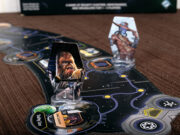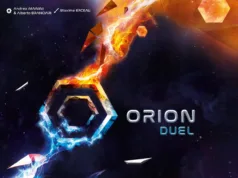 As Board Game Quest’s resident movie person, I’m always the first person handed cinematic tie-in games. But—for some reason—the game Guttenberg wasn’t immediately sent to my desk after it arrived at BGQ headquarters. “How could this be?” I thought. “Why wasn’t I being given a game based on the life and career of beloved 80s actor Steve Guttenberg?” I angrily contacted our benevolent publisher about this oversight (there was even an HR meeting to address the tone with which my email was sent) and a few days later I was well on my way to reviewing a game that, presumably, would involve behind the scenes high jinks on the set of the Police Academy franchise.
As Board Game Quest’s resident movie person, I’m always the first person handed cinematic tie-in games. But—for some reason—the game Guttenberg wasn’t immediately sent to my desk after it arrived at BGQ headquarters. “How could this be?” I thought. “Why wasn’t I being given a game based on the life and career of beloved 80s actor Steve Guttenberg?” I angrily contacted our benevolent publisher about this oversight (there was even an HR meeting to address the tone with which my email was sent) and a few days later I was well on my way to reviewing a game that, presumably, would involve behind the scenes high jinks on the set of the Police Academy franchise.
But to my surprise, Katarzyna Cioch and Wojciech Wisniewski’s design has nothing to do with the actor at all. It’s called Gutenberg (one less “t” in there) and is about some much less famous guy who invented a printing press in the 15th century or something. My disappointment was at an all-time high and—after sending another sternly worded email to Tony—I begrudgingly sat down to try out this one- to four-player game that takes about 90 minutes to play.
Gameplay Overview:
Gutenberg is a drafting-ish, auction-ish game in which players are attempting to gather the necessary equipment to fulfill various aspects of printing orders. At the beginning of the game, the board will be set up with available cards that players can acquire. On their turn, players can choose to:
- Take Orders they’d like to try to fill
- Take Inks to use on refinements for these orders
- Develop Specialties, which involves moving up tracks belonging to four icons
- Improve Printing House (this is the fun gear part of the game you’ve likely heard about)
- Take the Patronage action and it’s something of a potpourri that either involves taking a free action seen elsewhere or snagging a valuable card if its requirements can be met.
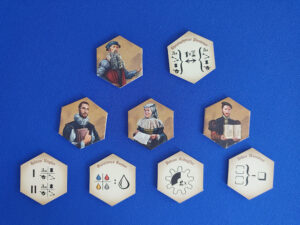
At the start of each turn, players will secretly allocate their initiative marker cubes to determine which of these actions they want to take on a given turn. The number of cubes each player places on a particular action will determine the “strength” of that action. The player who puts the most cubes on an action will get to take it first. (There’s really no attempt to explain this thematically. Maybe whomever put more cubes on a space had an energy drink that morning and can run faster?)
Once this bidding procedure is complete, players will then carry out the actions in strength order; they will collect their resources, move up the chosen tracks, and so on. Each of the things players do on their turn is handled slightly differently. Moving up the tracks for the various disciplines is as simple as selecting the icons that are on one of the available cards and then gaining any rewards associated with your track level. Obtaining ink involves a progressively more expensive price system where the first ink in a given turn will always be free but then the ones in the line after it cost you money and force you to take all the cheaper ones below it as well.
In the middle of the board is the spot to improve one’s printing house and this is probably the most innovative (and fun) aspect of Gutenberg. Players can take one of the available gears from the board and add it to their own personal player board. Each gear has three sectors that grant a once-per-round reward. These rewards range from making ink colors interchangeable or ignoring costs for certain items. Players may add up to three of these gears to their board during the game and can create combos by lining up the powers properly so that when the top gear turns at the start of the next round the two new powers can synergize.
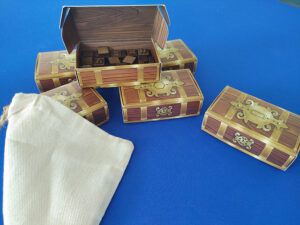
And why are players doing all these things? Great question, intrepid reader. They’re attempting to fill printing orders. Each printing order is paired with a Refinement card. The printing order itself needs to have everything on it completed for it to be filled. These are always represented by individual types that players must have in their supply when they go to fill the order. (These types are those neat little wooden pieces that actually look like they belong in a printing press.) Types are not spent when fulfilling an order (that’s why Gutenberg’s invention was so cool all those centuries ago), so players keep them, but each type can only be used once per round.
The second aspect of fulfilling orders is the optional Refinement card. These usually involve adding colored ink to an order and/or that the player be at a certain level in one of the discipline icons on their player board. This aspect is optional and players can do either or both extra criteria to receive an escalating series of benefits. Unlike types, however, ink spent on orders is gone forever and players will have to reacquire the colors on a different turn if they want to fill another order using ink. Filling orders is part of the game round and all players will have a chance to do this without spending initiative on it.
That’s more or less the gist of how the game plays. It lasts for six rounds and whoever has earned the most points throughout the game is the winner.
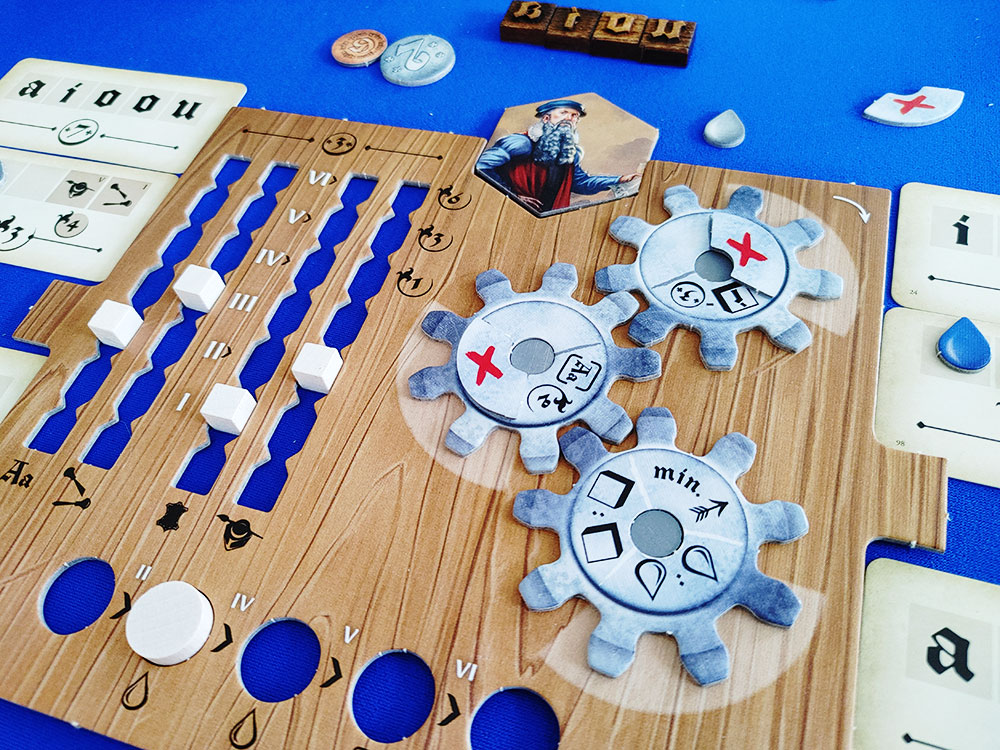
Game Experience:
For what is at its core a Euro game, it’s undeniable that Gutenberg looks a lot cooler than most of its brethren at first glance. The neat little type tokens and the spinning gears and tracks to move up or down (love me some track movement). But once you start playing it, all those gimmicks actually help the game transcend what could have just been another throwaway dry Euro. The theme actually comes through pretty strongly, particularly when fulfilling orders by lining up types and colors.
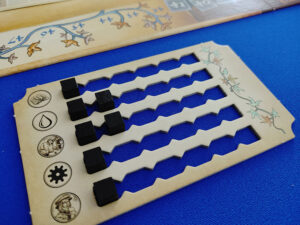
The theme is a little harder to understand when players are blind bidding to take turns, but by the end of the round, it actually feels as though players are running a print shop with one too many orders and not enough staff or materials. Thematic integration isn’t always necessary in a well-designed game but is always a pleasant surprise.
Along with that breezy play comes a few design issues that I’d like to explore. The blind bidding at the start of each round for the available actions is fun (it gave me real Fresco vibes), but the decision space regarding what a player needs for the round is always pretty clear and so the game becomes more about what everyone can get away with while not giving everyone around the table too much freedom. This is clearly intentional and works quite well, but I do wish there was more complicated information from an individual player’s perspective.
Perhaps having something extra that is as valuable as fully completing orders on the board would give players something else to chew on as they line up their blind bidding. As it stands now, if a player really needs to finish an order it always makes sense to go after the things you need with the limited initiative cubes at your disposal.
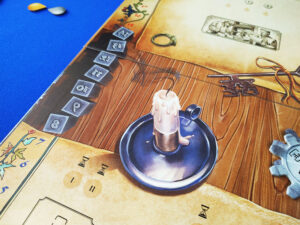
This is a minor complaint because everything is balanced, but I think an expansion with additional secret goals could help fill out this game quite nicely. Or even something like in Wingspan where specific rounds have goals that players can rank in so that it will ramp up the competition for certain spots on the board even further. One aspect I didn’t mention in my overview was that the game also comes with individual player powers which are neat but pretty basic and don’t alter the game as much as I had hoped they would when they were introduced as something of a special “expert” variant.
Final Thoughts:
From a gameplay perspective, this might be one of the cleanest and breeziest designs of this type I’ve played in a long time. After a brief rules explanation, rounds go by so quickly that it’s difficult to even comprehend that the game is over after the sixth round. This is always a welcome revelation since often modern Euro designers think adding complexity is the best way to make a game more memorable.
So, despite the lack of a proper Police Academy or Three Men and a Baby tie-in, I feel that Gutenberg is a really strong Euro game. It doesn’t do anything particularly innovative, but it’s a clean design with some risk/reward mechanisms that I really enjoy. While I do hope some complexity is added to a possible expansion, this is definitely a game I had a lot of fun playing and look forward to playing more in the future.
Final Score: 4 Stars – A fun, tight design that combines streamlined Euro elements in a quick playing package.
 Hits:
Hits:
• Plays fast
• Surprisingly strong theme integration
• Excellent components
Misses:
• Could use a few more complicating factors to ramp up decision space
• Some of the artistic choices on the board are a little confusing (backwards numbers on the score track, for example)
• Solo mode is just okay



